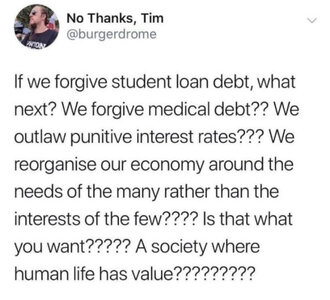Yes. As someone who tread the harder path, I would. It is the only way forward as the last first world without free or heavily subsidized education. America could easily subsidize all education, if we wanted. We already rank low middling in the education pack(along with most other quality metrics) and it has much to do with inequitable allocation of resources. It's foolish and shortsighted. I wish there had been more help for me, but I'm not going to prevent the next generation receiving said help. For me, that's like saying no to the wheel because I only knew the sledge. It's our future.
True. They could always create a solution for people that have already paid off their loans. Possibly, tax breaks.




300x240.png)